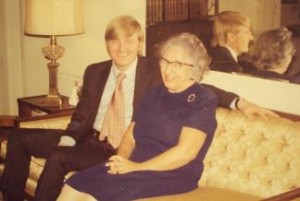 My wall calendar has a name on yesterday’s date: “Aunt Agnes.” My orange pen is kept busy marking birthdays, anniversaries, and significant death dates on the different squares. Aunt Agnes’ name is in parentheses, indicating she has passed away. She died 34 years ago and would have been 111 today, had she lived.
My wall calendar has a name on yesterday’s date: “Aunt Agnes.” My orange pen is kept busy marking birthdays, anniversaries, and significant death dates on the different squares. Aunt Agnes’ name is in parentheses, indicating she has passed away. She died 34 years ago and would have been 111 today, had she lived.
Since Aunt Agnes died, there’s been a great deal of orange ink added to the calendar, the births of many babies and the addition of new friends’ birthdays. Sadly, lots of death dates have been added, too. If I live to be an old lady, will there be orange print on every square?
Most of us keep track of life by our calendars, and it’s hard to imagine a future time when we’ll no longer need them. But Aunt Agnes (and Nate) are living in a calendar-free environment along with millions of others, and one day we’ll be there, too.
At the moment of death, time comes to a screeching halt, a truth we have trouble internalizing. None of us has ever known life outside of time. Everything we do depends on the day-night cycle of 24 hours: sleeping, eating, working and taking out the garbage.
When we no longer have access to a clock or a calendar, how will we know what to do when? What if we forget some important dates?
I’ve been frightened thinking about eternity, not about the afterlife in general but about not having a way to mark time. God made all of us time-sensitive. It’s possible Adam and Eve were the only two people who didn’t give time a thought, though they did experience day and night, morning and evening. After death, even those general guidelines disappear.
Back in the sixties, during the Viet Nam War, POWs found ways to mark off their days in captivity, even if it was just a dot on the wall. We all want to know where we stand. Yet from ages past, Scripture has taught that we’re eternal beings, meant to live forever. In our heart-of-hearts we know that, but have we embraced it?
More often than not we ascribe calendar characteristics to heaven. We say, “Grandma has celebrated five birthdays with Jesus now,” or “Dad has enjoyed 19 Christmases in paradise.” This we understand. But from their perspective, heaven’s citizens know we’re talking nonsense.
 On several occasions I’ve sat quietly and meditated on the word “eternal,” trying hard to take in its meaning and begin thinking biblically. But each time it’s been unsettling. There’s always more… and more… and more. This doesn’t compute for me. It does for some people, though, Aunt Agnes and Nate among them.
On several occasions I’ve sat quietly and meditated on the word “eternal,” trying hard to take in its meaning and begin thinking biblically. But each time it’s been unsettling. There’s always more… and more… and more. This doesn’t compute for me. It does for some people, though, Aunt Agnes and Nate among them.
I guess the only way to cope with such a mystery is to entrust it to God’s keeping, knowing he’ll explain it to us when the time… is right.
“He has set eternity in the hearts of men; yet they cannot fathom what God has done from beginning to end.” (Ecclesiastes 3:11)
